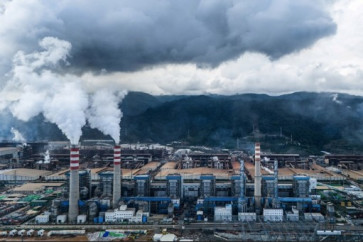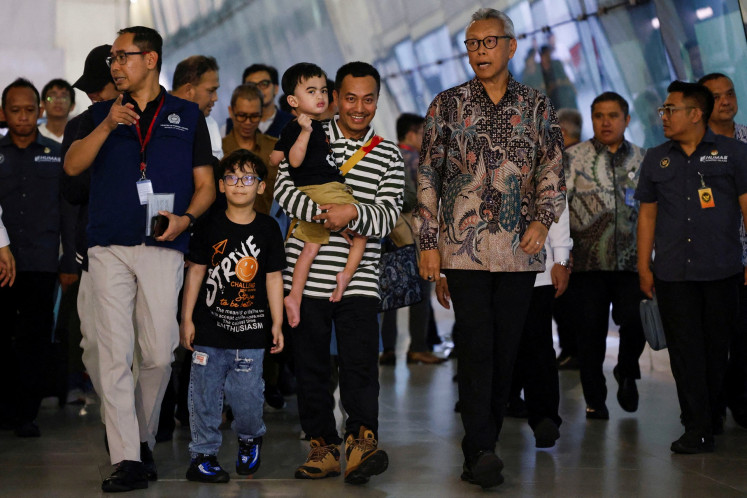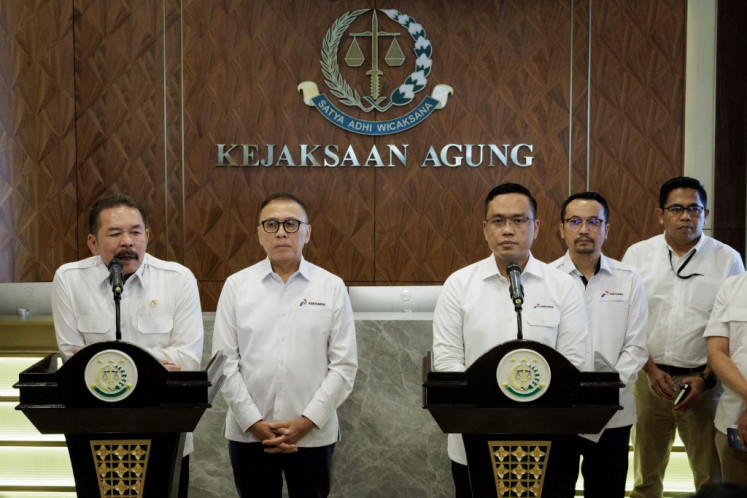Popular Reads
Top Results
Can't find what you're looking for?
View all search resultsPopular Reads
Top Results
Can't find what you're looking for?
View all search results‘Indomie’ expansion seeks larger chunk of European market
Despite having lived in Munich, Germany, for more than 10 years, Natalia Safitri, 40, and her teenage son Bagas have never lost their appetite for the instant noodles they used to eat back in their home country of Indonesia
Change text size
Gift Premium Articles
to Anyone

D
espite having lived in Munich, Germany, for more than 10 years, Natalia Safitri, 40, and her teenage son Bagas have never lost their appetite for the instant noodles they used to eat back in their home country of Indonesia.
To indulge her longing for the noodles she sometimes buys some at an Asian shop or asks her visiting relatives to bring her the product.
In the coming few months, Indonesian nationals and instant noodle lovers across western Europe may find their favorite food in local supermarkets.
Indonesian instant noodle giant PT Indofood Sukses Makmur is spicing up its western European market, thanks to the inflow of migrants to the northern continent, many of whom, including those from Africa, have been familiar with the product back home.
Millions of migrants from Africa have sought asylum in Europe over the last decade by crossing the Mediterranean Sea. A former United Kingdom envoy to Libya, Joe Walker-Cousins, has said 1 million people from across Africa are en route to Europe via Libya this year alone.
The company’s sales and marketing representative in Italy, Yulia Kartini, said that to further its European market penetration the company had just signed a deal with an Italian supermarket chain to sell Indofood’s most prominent product, Indomie, in five of its stores in Verona, Mantova and Brescia.
“It was just a start. Our product used to be found only in an Asian shop, but now it is present in supermarkets,” Yulia said on the sidelines of a recent gathering organized by the Indonesian Trade and Promotion Center in Milan.
For Indofood, Italy is a growing market in Europe, with sales reaching 5 million packs last year, triple that of 2012. Yulia said the instant noodle’s presence in supermarkets was part of the company’s bid to raise its sales target in Italy to 7 million this year.
In comparison, sales in the UK have reached 9 million to 10 million packs, the largest in Europe. In Germany 7 million are sold and in Spain 4 million per annum. The instant noodles are directly imported from Indonesia.
Indofood opened in August last year its first European factory in the Serbian town of Indjija, 60 kilometers north of the capital city of Belgrade, with a monthly production capacity of 500,000 packs. Serbian President Tomislav Nikolic inaugurated the operations of the plant, which is said to employ hundreds of people in the country.
Yulia said the Serbian factory focuses on the eastern European market. When asked if the company would build another plant in Europe, Yulia said it would depend on the market growth in the 13 European countries it has entered.
Indofood booked an 8 percent growth in its net sales to Rp 17.83 trillion (US$1.3 billion) as of March compared with in the corresponding period last year. Its net profits grew by 11 percent year-on-year (yoy) to Rp 1.2 trillion during same the period.
For 2017, it has allocated Rp 9.1 trillion in capital expenditure (capex), an increase of almost 20 percent from the Rp 7.6 trillion allocated in 2016.
Speaking in a press conference earlier this month, Indofood director Thomas Tjhie said most of the capex would be used for expansion rather than acquisition, claiming that the company did not have any acquisition plans this year.
The company’s consumer brand products division — run by food producer PT Indofood CBP Sukses Makmur — has obtained the largest chunk of this year’s capex figure with Rp 4.6 trillion, followed by the Bogasari division, which produces wheat flour and pasta, with Rp 2 trillion, the agribusiness division with Rp 2 trillion and the distribution division with Rp 500 billion.
With the exception of agribusiness, all divisions saw their capex increase between 18 percent and 67 percent from last year.









